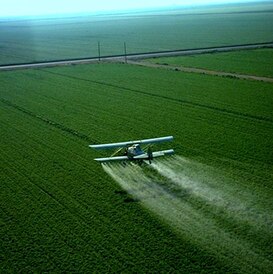|
Quick Facts
|
About Pesticides
Pesticides are substances (often chemical) designed to kill pests, including insects (insecticides), weeds (herbicides), and fungi (fungicides). When used in outdoor applications, such as gardens, lawns, or in agriculture, pesticides can contaminate surface and groundwater supplies.
The hazard of pesticides depends on the toxicity of the specific contaminant and the exposure amount/duration. Even low-toxicity products can be hazardous if the exposure is high enough. Health risks may be acute, causing immediate symptoms after consuming a high dose, or chronic, particularly if a low dose is ingested over a long period of time. Potential long-term health risks include decreased fertility, endocrine disruption, and increased cancer risk.
Pesticides are substances (often chemical) designed to kill pests, including insects (insecticides), weeds (herbicides), and fungi (fungicides). When used in outdoor applications, such as gardens, lawns, or in agriculture, pesticides can contaminate surface and groundwater supplies.
The hazard of pesticides depends on the toxicity of the specific contaminant and the exposure amount/duration. Even low-toxicity products can be hazardous if the exposure is high enough. Health risks may be acute, causing immediate symptoms after consuming a high dose, or chronic, particularly if a low dose is ingested over a long period of time. Potential long-term health risks include decreased fertility, endocrine disruption, and increased cancer risk.
Treatment
Point-of-use devices like reverse osmosis can be used to reduce pesticides in drinking water. Activated carbon is also effective; the filters act as an adsorbent to remove or reduce levels of contaminants that affect the taste and odor of water as well as harmful solvents, including pesticides and other chemical waste. Ozone oxidation can also reduce natural and synthetic organic compounds (including pesticides).
Point-of-use devices like reverse osmosis can be used to reduce pesticides in drinking water. Activated carbon is also effective; the filters act as an adsorbent to remove or reduce levels of contaminants that affect the taste and odor of water as well as harmful solvents, including pesticides and other chemical waste. Ozone oxidation can also reduce natural and synthetic organic compounds (including pesticides).




